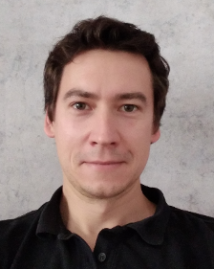
Pavel Dvořák is currently an Associate Professor and group leader at Masaryk University, Brno, Czech Republic. He obtained his M.Sc. (2009) and Ph.D. (2014) degrees in Molecular Biology with honors at Masaryk University. He started his research career at Loschmidt Laboratories, the protein engineering group of Jiří Damborský. At that time, he was focused on the design of synthetic enzymatic cascades for the degradation of halogenated anthropogenic pollutants and he introduced elements of synthetic biology and systems metabolic engineering in the biodegradation & bioremediation field.
Pavel conducted post-doctoral research (2015 – 2018) in the laboratory of Víctor de Lorenzo in CNB-CSIC, Madrid, Spain. He was awarded a two-year Marie S. Curie fellowship for a project aimed at re-factoring the metabolism and cellular surface of bacterium Pseudomonas putida for the biotechnological processing of carbohydrates from lignocellulosic residues. In 2019, he established Microbial Bioengineering Laboratory back at Masaryk University and since then has continued in taming environmental bacteria for the degradation and valorization of lignocellulosic substrates. He was awarded several prestigious national research grants including the Masaryk Award in Science and Humanities Junior. He authored and co-authored 21 publications and three patents and was recently elected a board member of the Bioengineering & Bioprocessing Division of the European Federation of Biotechnology.
Besides research activities, Pavel is also involved in teaching, mentoring, and science popularization. Since 2019, he has provided individual training to 10 undergraduates, 3 Ph.D. students, and two postdocs. He guarantees semestral courses and practices including a course on the basics of metabolic engineering and synthetic biology. He was one of the PIs of the first Brno iGEM team, whose project CYANOTRAP was selected among the TOP 5 in the Environmental category in 2020. He is a co-founder of the civic organization Biomania, which organizes popular student scientific conferences on biotechnology, bioengineering, and biomedicine with attendees from all around Europe. His long-term ambition is to foster the scientific curiosity and societal responsibility of his students, stimulate better public awareness of microbial biotechnologies and their role in the knowledge-based bioeconomy, and perform innovative research that will contribute to the sustainable development of our society.
